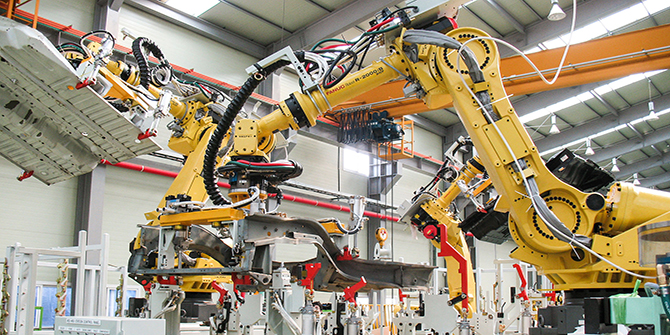Jucheguevara (talk | contribs) (added intros to quotes) Tag: Visual edit |
Jucheguevara (talk | contribs) (removed characterizations, we must keep this as scientific as possible) Tag: Visual edit |
||
| Line 2: | Line 2: | ||
'''Automation''' describes a wide range of technologies that reduce human intervention in processes, typically in the realm of economic production. | '''Automation''' describes a wide range of technologies that reduce human intervention in processes, typically in the realm of economic production. | ||
Under the | Under the [[Capitalism|capitalist]] economic system, these labor-saving technologies threaten the material interests of the working class by displacing jobs. Manual laborers are in competition with machines, while knowledge workers are in competition by information systems. | ||
Under a | Under a [[Socialism|socialist]] economic system, labor-saving technologies can be used to enhance the quality of life for the working class by reducing work hours, enhancing societal productivity, and moving towards the immense abundance of [[post-scarcity]]. | ||
== Quotes == | == Quotes == | ||
Revision as of 18:40, 18 January 2022

Automation describes a wide range of technologies that reduce human intervention in processes, typically in the realm of economic production.
Under the capitalist economic system, these labor-saving technologies threaten the material interests of the working class by displacing jobs. Manual laborers are in competition with machines, while knowledge workers are in competition by information systems.
Under a socialist economic system, labor-saving technologies can be used to enhance the quality of life for the working class by reducing work hours, enhancing societal productivity, and moving towards the immense abundance of post-scarcity.
Quotes
Che Guevara
Che Guevara, the revolutionary who helped to liberate Cuba from the shackles of US imperialism, said the following regarding the relationship between workers and machines.
We must remember that machines do not, as in the capitalist system, compete with workers or enslave workers. Workers must view machines as the liberators of their force. Machines are placed at the service of workers as soon as the exploitation of man by man stops. And that is what we are striving for: we are trying to turn machines into liberating instruments of peasants, so they will have more time for leisure, so they will have more time to study, to develop in every sense, to achieve the most important thing we must achieve: individuals developed to the full, this is the aim we are all struggling for.[1]
Stephen Hawking
Stephen Hawking was a world-renowned theoretical physicist and cosmologist who has contributed significantly to both fields. The following quote is from a Reddit reply he wrote towards the end of his life.
If machines produce everything we need, the outcome will depend on how things are distributed. Everyone can enjoy a life of luxurious leisure if the machine-produced wealth is shared, or most people can end up miserably poor if the machine-owners successfully lobby against wealth redistribution. So far, the trend seems to be toward the second option, with technology driving ever-increasing inequality.[2]
References
- ↑ Speech at the National Sugar Plenary Meeting in Camagüey, February 9, 1963 Ernesto Che Guevera. Escritos y discursos. Op. cit., vol. 7.
- ↑ "STEPHEN HAWKING'S WARNING ON ROBOT AUTOMATION IS MORE RELEVANT THAN EVER".